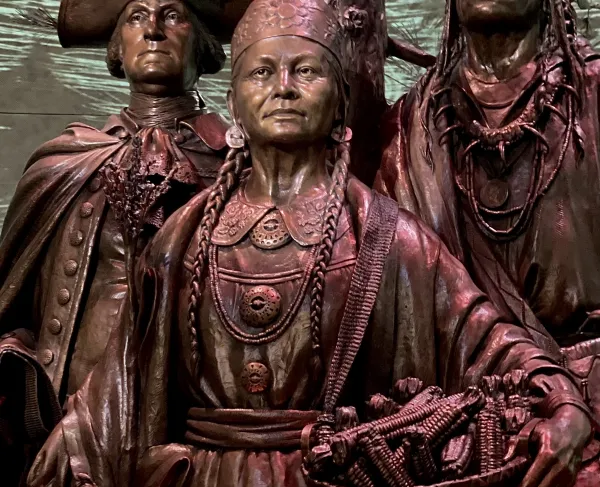Polly Cooper

Polly Cooper of the Oneida Indian Nation helped save Continental soldiers’ lives after they suffered through the harsh winter of 1777-78 at Valley Forge. Yet, we know little about this Revolutionary War heroine. Historians have uncovered few details about her life in the archival record. Thanks to the Oneida Indian Nation, Cooper’s dedication to caring for General George Washington’s army through illness and hunger endures in our memory.
The Oneida Indian Nation was an ally of the American cause during the Revolutionary War. Many Oneidas supported the war effort as warriors and scouts, playing critical roles in several engagements such as the Battle of Oriskany. But the Oneidas bravery and generosity off the battlefield also proved pivotal to the fight for American independence. In December of 1777, Washington moved the Continental Army to their winter quarters at Valley Forge. His exhausted troops struggled to survive the harsh conditions. Disease was rampant. Thousands of soldiers lacked proper clothing and food supplies. So, when Oneida Chief Oskanondonha, or Skenandoah, sent a group of warriors to join the army at Valley Forge, he also sent a gift of surplus corn with the expedition. Cooper – skilled in cooking and medicine – joined roughly 50 warriors in their mission to provide much needed relief to Washington’s men.
Cooper’s party began its journey from New York in April 1778, traveling hundreds of miles by foot to Pennsylvania. They arrived in Valley Forge with hundreds of baskets of white corn. Since white corn takes careful preparation before it can be eaten, Cooper taught soldiers and their families how to properly cook it. She also cared for sick soldiers, refusing to accept any pay for her services. According to oral tradition, some of the soldiers’ wives – or even Martha Washington herself – presented Cooper with a black shawl to show their immense gratitude for her aid.
Cooper’s descendants and the Oneida Indian Nation ensure her selfless acts are not forgotten. Her descendants recorded her story and have cared for her shawl for generations. Recently, the Oneida Indian Nation donated a statue of Cooper standing alongside Washington and Oskanandonha to the Smithsonian’s National Museum of the American Indian to commemorate the alliance between the Oneida Indian Nation and the United States.





